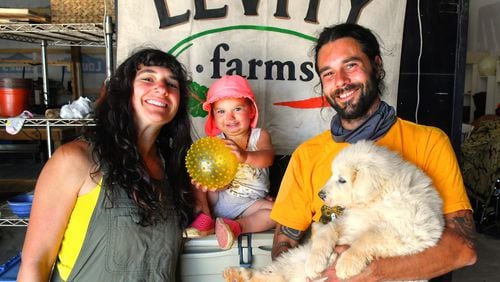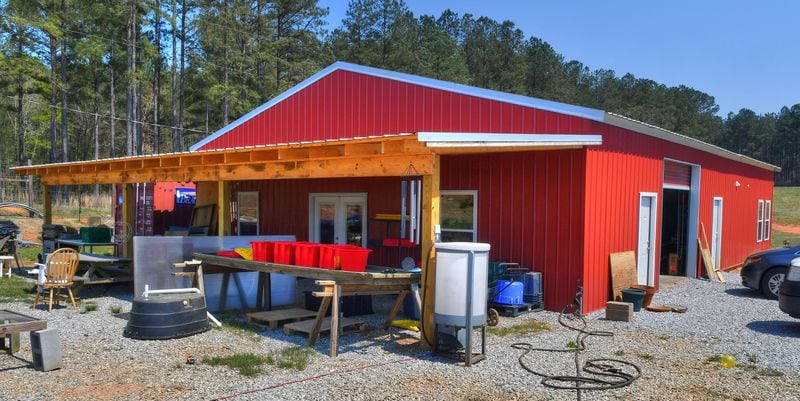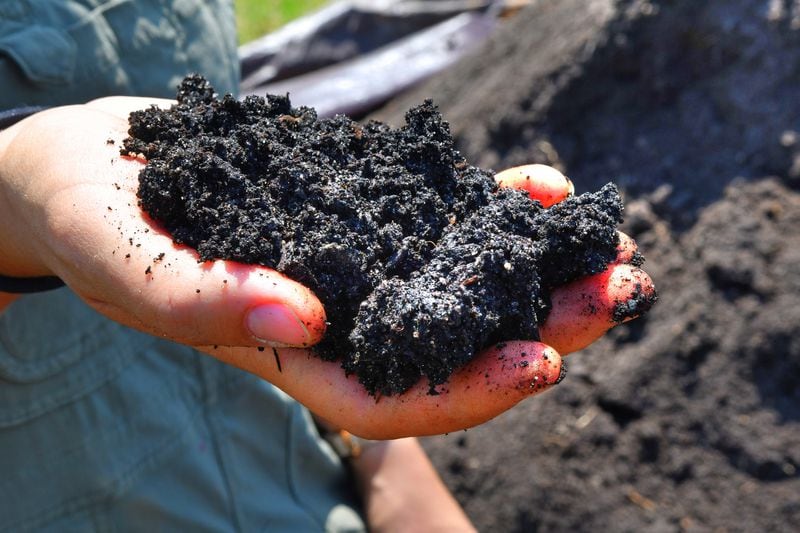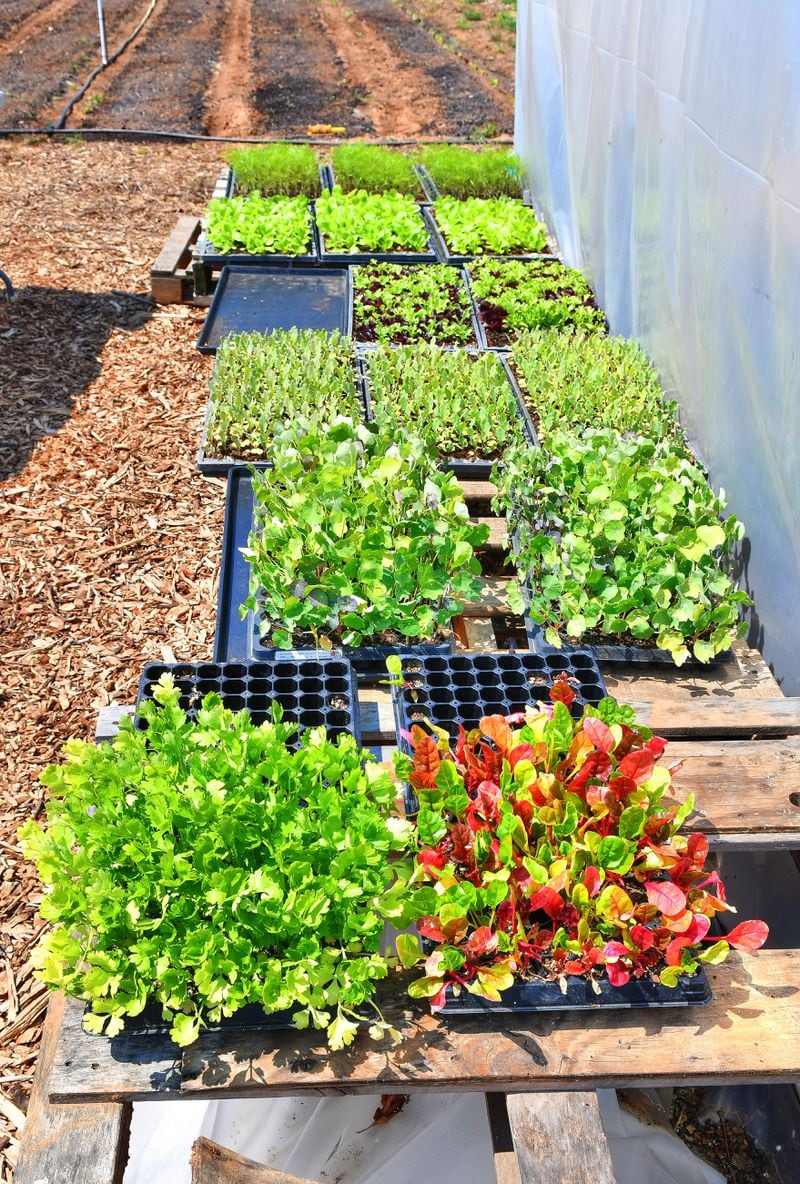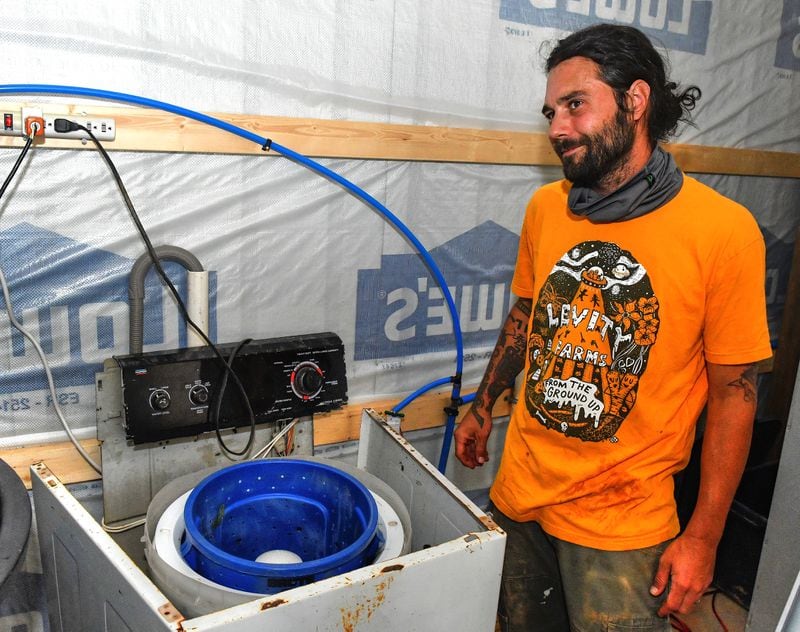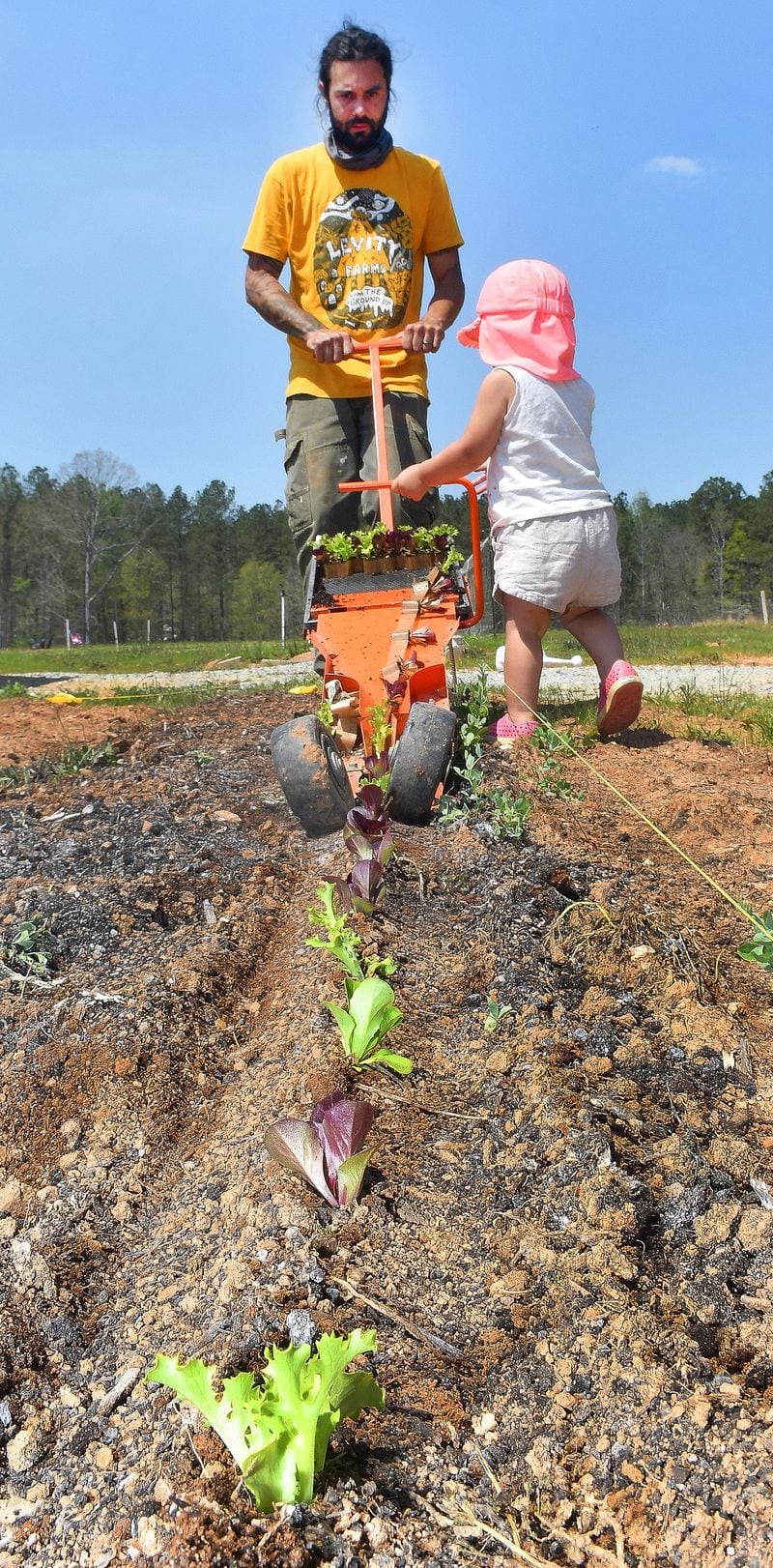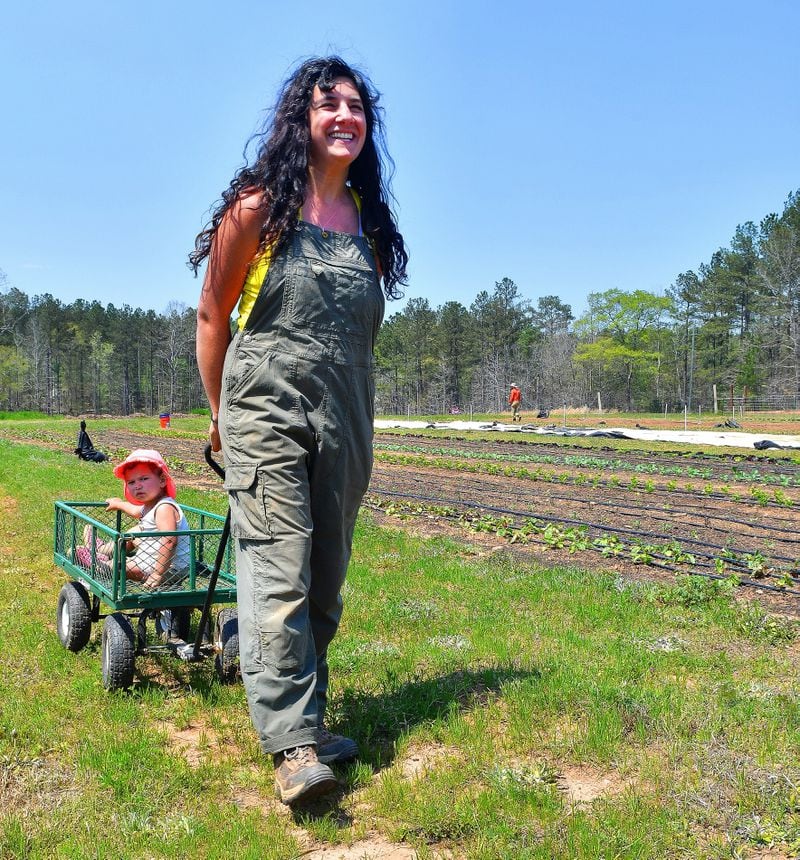MADISON — Zach and Ilana Richards sleep in a barn. They only recently got a bathroom. But the couple’s dreamy enthusiasm for their way of life would leave you to believe they found Utopia.
The Richardses purchased their slice of paradise last fall: 10 acres of land in Madison, about an hour’s drive east of Atlanta, just south of I-20. It’s now the permanent home for Levity Farms, the farming operation that they carried out the previous four years on a small rented tract in Milton.
It’s on these 10 acres where they are planting roots of all sorts — leafy greens and crunchy munchy produce, rows of perennials destined for floral arrangements, and that red barn, 900 square feet of which counts as home for themselves, their 18-month-old daughter Harlyn, guard dog Freedom and fluffy puppy Mulch.
Credit: Chris Hunt
Credit: Chris Hunt
I was interested in seeing the Levity Farms way of life in person after having heard about the Richardses’ approach to farming, which is guided by the principles of permaculture.
Before my visit, Ilana emailed me a permaculture primer: “As a permaculture-inspired farm, we focus heavily on the soil and fostering a healthy soil food web. We understand that healthy soil grows healthy plants, which then feed healthy people, so we do our best to contribute to the health of the soil, as closely based on the laws of Nature as possible, in an efficient and responsible way,” she wrote. “The idea is to utilize farming practices in such a way as to create, sustain, and regenerate healthy productivity. This takes more labor per acre to begin with, but the quality of food we grow and life we live as a result of these practices is worth every drop of sweat.”
Credit: Chris Hunt
Credit: Chris Hunt
In a 2016 story published in Modern Farmer, writer Brian Barth offers a succinct definition of permaculture as a “holistic, living-in-harmony-with-nature worldview, as well as technical approach for how to do so.”
Practitioners are known as “permaculturists,” or simply “permies.”
Zach got his first taste of permie life when he trained as a field manager on a permaculture farm in Jasper. He painted such an idyllic picture of the place that Ilana decided to join him and live with him in his “romantic little cabin.”
“It was a goat stall,” recounted Zach, laughing. Soon afterward, they got engaged. The two permies tied the knot in 2018.
Since then, they’ve also done their own bit of permie proselytizing, having convinced longtime friend Taylor Young to leave behind a career in fine dining (he’s is a former chef de cuisine at Kyma and had been working for esteemed chef Grant Achatz in Chicago until the pandemic hit) to help them tend to their green acres.
From the gravel road, Levity Farms looks like a modest small-scale organic vegetable farming operation with green leaves poking out of tidy rows, including a few protected from the elements by white hoop houses. It’s what you don’t see that offers clues to the uniqueness of their style of farming: not a single sit-on-top tractor or other hulking ag equipment.
Credit: Chris Hunt
Credit: Chris Hunt
I watched Zach prep a plot using a walk-behind tractor that he pushed with two hands. “It’s the heaviest machinery on the farm,” remarked Ilana. Smaller equipment, apart from being more affordable, doesn’t compact the soil as much, allowing a better flow of oxygen and water beneath the surface, she explained.
It’s just one example of the “lean farming methods” that, as Zach put it, “minimize inputs to maximize outputs” as they grow specialty crops like thumb-sized Mexican gherkins; root veggies like beets, radishes and carrots; stir-fry worthy heads of Tokyo Bekana, a signature salad mix, butterhead lettuce, and other delicate and hearty greens that take a spin in a dinged-up Maytag washing machine that Zach converted into an industrial-sized salad spinner. It all gets bagged or boxed and placed in a cooler destined for some of Atlanta’s most popular restaurants, including Gunshow and Kimball House, as well as local online marketplace Fresh Harvest.
Credit: Chris Hunt
Credit: Chris Hunt
Another efficiency is their adoption of a Japanese innovation called a paper pot transplanter system designed to minimize physical labor. Zach offered a demo, grabbing a tray of lettuce seedlings and loading it on the deck of a lightweight tool about 7 feet long that looks like a cross between a scooter and a narrow Radio Flyer wagon.
The seedlings in the tray had been planted in individual but interconnected biodegradable paper pots that essentially form a wound-up paper chain. As the transplanter is pulled forward, the paper chain unwinds. A built-in plow in front cuts a furrow into the soil to receive the pots, while sweeps and the rear wheels close the furrow around the wee plants. Paper chain pots are available for 2-, 4-, and 6-inch row spacing, and in varying lengths, to accommodate crop type and plot size.
Credit: Chris Hunt
Credit: Chris Hunt
Zach explained the benefits of this system compared to transplanting by hand. “If I were to plant this 100-foot bed of plugs of the lettuce, it would take me about an hour and a half. There would be a lot of bending down. With something like this, I could do it in maybe 10 minutes with minimum labor.” Although the paper chains are single-use, “it’s worth what you save in time — and rows are perfectly straight,” he said.
It’s so simple that even baby Harlyn can lend a hand.
“You want to help pull?” asked her dad.
He grabbed the handles while Harlyn gripped the stem.
“Pull, pull pull,” encouraged her mother as they walked down the row of dirt. In minutes, the greens were in the ground.
“Good job, baby,” applauded Ilana. “She’s such a good farm baby!”
A field walk at Levity Farms isn’t that expansive — just the greenhouse, some sheds, a composting staging area and about 1 acre of cultivated land — but the Richardses say the property is well suited to their needs.
“Ten acres is too small for a conventional farm and too big for a small farm, but it’s perfect for us,” Ilana said. “It’s great for permaculture.”
Credit: Chris Hunt
Credit: Chris Hunt
They’ve got plenty of plans for the future. Ilana discussed her excitement for their burgeoning cut flower business as she walked along a slope, pointing to newly planted calendulas, zinnias and dahlias. They also want to make their own compost, start an orchard, get some sheep — maybe someday even build a house on the back side of the land and move out of the barn, which just months ago was no more than a roof held up by four square posts with no walls, no floor, no bathroom.
“When we rented land, it didn’t make sense to build permanent infrastructure,” Ilana said. “Now that we have our own space, we can be here forever.”
For more information about Levity Farms, visit levityfarms.com. Find more stories about Georgia farmers and recipes for their products at ajc.com/georgia-on-my-plate.
About the Author
